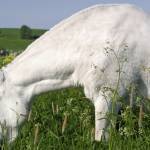Dietary Restriction and Age-Related Illness in Horses

Medical advances over the past several decades allow humans, horses, and other animals to lead long, productive lives. In fact, horses now thrive well into their 30s, with many continuing to safely participate in athletic endeavors. With increased life span, however, comes an upsurge in age-related diseases, and fasting might just be the cure, according to some researchers.
Aging-related diseases in humans include neurodegenerative diseases, such as Alzheimer’s disease. Diagnosis of neurodegenerative diseases climbs each year, and the disorders are currently considered the biggest global burden of disease*.
“Horses also suffer from degenerative conditions affecting the nervous system,” said Kathleen Crandell, Ph.D., an equine nutritionist for Kentucky Equine Research.
For example, horses can develop a condition called equine motor neuron disease (EMND). This is an acquired condition caused by the degeneration of motor neurons that signal muscles to contract and function normally. Horses with EMND suffer weight loss and muscle atrophy, despite having a good appetite. They often sweat excessively following exercise, and muscle fasciculations are commonly noted. EMND is similar to Lou Gehrig’s disease (amyotrophic lateral sclerosis, ALS) in humans, according to a review article published by Stephen Reed, D.V.M, of Rood and Riddle Equine Hospital in Lexington, Ky**.
Researchers in the field of aging-related disease suggest that fasting—or even simply dietary restriction—is an anti-aging technique that could help combat the rise in neurodegenerative diseases in the elderly.
Kalsi* reviewed the available literature on the impact of dietary restriction on age-related diseases and nerve cell degeneration in animals and humans. He found that dietary restriction improves the integrity of nerve cells by a wide range of possible mechanisms, including:
- Changes in metabolism (reduced insulin and glucose levels, for example);
- Oxidative damage (nerve cell damage from reactive oxygen molecules);
- Adaptive stress responses;
- Growth factors that protect nerve cells from damage; and,
- Gene expression (increased production of anti-aging proteins).
According to Kalsi, these mechanisms are extensively interlinked and point to an optimum range of calorie intake that falls somewhere above calorie deprivation and below burdensome calorie excess.
“Rather than developing pharmacological mimetics of dietary restriction (DR), our focus should be on educating the public about DR in order to minimize age-related disease,” concluded Kalsi.
“Despite these positive findings, no abrupt change should ever be made to a horse’s diet without consulting an equine nutritionist or your veterinarian. At this point, dietary restriction for combating age-related disease remains theoretical. That said, overweight horses are unhealthy horses, and owners are encouraged to keep their horses at a body condition score of 5-6 on the Henneke scale,” advised Crandell.
*Kalsi, D.S. 2015. What is the effect of fasting on the lifespan of neurons? Ageing Research Reviews. 24:160-165.
**Reed, S.M. 2012. Neurodegenerative diseases of horses: Equine motor neuron disease and equine degenerative myeloencephalopathy. In: “Modern Feeding Management for Healthy and Compromised Horses.” Proc. 18th Kentucky Equine Research Conference, Lexington, Ky., p.133-137.








